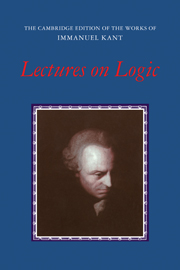Book contents
- Frontmatter
- Contents
- General editors' preface
- Acknowledgments
- Translator's introduction
- PART I The Blomberg logic
- PART II
- PART III The Dohna-Wundlacken logic
- Prolegomena
- Tractatio ipsa
- The doctrine of elements
- Doctrine of method
- PART IV The Jäsche logic
- PART V Appendixes
- Explanatory notes
- Name index
- Subject index
Prolegomena
Published online by Cambridge University Press: 05 June 2012
- Frontmatter
- Contents
- General editors' preface
- Acknowledgments
- Translator's introduction
- PART I The Blomberg logic
- PART II
- PART III The Dohna-Wundlacken logic
- Prolegomena
- Tractatio ipsa
- The doctrine of elements
- Doctrine of method
- PART IV The Jäsche logic
- PART V Appendixes
- Explanatory notes
- Name index
- Subject index
Summary
{All things between heaven and earth occur and act according to rules, e.g., bodies according to the laws of gravity.}
One must reflect on his thought, i.e., do it according to rules. Every language is bound to certain particular rules. This is so above all in the case of dead languages, where one can actually designate the rules. One can also use the rules without actually giving them names. One learns these rules gradually through attempts. The first ones fail[;] finally one attains skill. Among the rules of thought there are universal ones, which apply to particular objects without distinction. Thus there are universal rules of language, too. Such a grammar does not contain words, not a copia vocabularum, but rather only the form of language. We will be able to represent to ourselves a universal doctrine <of thought>. This universal doctrine of thought is called logic, doctrine of the understanding. It is a preparation for thinking about objects.
The understanding is the faculty of thinking <of understanding something>, of rules, the power of judgment the faculty of subsuming, reason of inferring what pertains to something <of having insight into it>. A rule is a concept under which much, a manifold of representations, is contained.
- Type
- Chapter
- Information
- Lectures on Logic , pp. 431 - 437Publisher: Cambridge University PressPrint publication year: 1992
- 1
- Cited by

